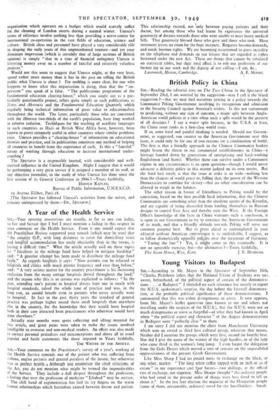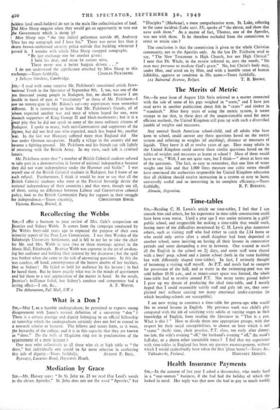Young Visitors to Budapest
SIR,—According to Mr. Mayer in the Spectator of September 16th, "Charles Pickthorn infers that the National Union of Students was un-. aware, beforehand, of the political aspect of certain of the demonstra- tions . . . at Budapest." I intended no such inference but merely to report the N.U.S. spokesman's surprise, the day before the farewell demonstra- tion, at the probable political significance of these demonstrations. I commented that this was either disingenuous or naive. It now appears, from Mr. Mayer's leaflet quotation (not known to me and others not travelling under the auspices of the N.U.S.), that the N.U.S. were not so much disingenuous or naïve as forgetful—of what they had known in April when " the political aspect an character " of the August demonstrations in Budapest were "perfectly dear" to them.
I am sorry I did not mention the choir from Manchester University which won an award as third best cultural group, whatever that means. Neither did I mention the groups which were first, second (or fourth) best. Nor did I give the name of the winner of the high hurdles, or of the lady who came third in the women's long jump. I even forgot the delegation from the Gobi Desert which moved a vote of censure on the unparalleled oppressiveness of the present Greek Government.
Like Miss Sharp I had no pound notes to exchange on the black, or any. other, market. "The long white coffee topped with an inch or so of cream " in my experience cost f9ur forints—two shillings, at the official rate of exchange, not sixpence. Miss Sharpe thought " the ordinary people who had voted in the present order of things were best fitted to tell us about it." In the last free election the majority of the Hungarian people (some of them, presumably, ordinary) voted for the Smallholders. Small-
rrs (and small-holders) do not in the main like collectivisation of land. id Miss Sharp enquire when they would get an opportunity to vote out ,the Government which is doing it?
I Miss Sharp says " the (my italics) policeman outside 60, Andrassy Urea has my autograph and I have his." There was never less than a dozen brown-uniformed security police outside that building whenever I passed it. I wonder with which Miss Sharp swopped autographs.
"By just exchange one for another given: I hold his dear, and mine he cannot miss, There never was a better bargain driven. . . ."
I do not understand the significance attached by Miss Sharp to this















































 Previous page
Previous page